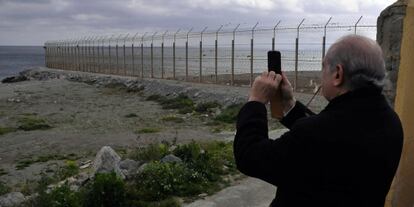Interior Ministry to install “anti-climb mesh” on Ceuta and Melilla borders
Fernández Diáz calls criticism of Civil Guard’s actions “immoral”

The Ceuta border will be reinforced with 20 more civil guard officers, a helicopter and anti-climb mesh fencing in the next few weeks, Interior Minister Jorge Fernández Díaz announced at the end of his visit to the Spanish North African exclave on Wednesday.
The goal is to try to stem what the Spanish government has categorized as a “rising tide” of sub-Saharan migrants trying to reach Europe by jumping the border fences from Moroccan territory into the exclaves of Ceuta and Melilla.
But the minister was less precise about how Spain might strengthen the bilateral agreement on the policing of the frontier it signed in 1992 with Morocco, a country he referred to as a “neighbor, friend, partner and ally” on two occasions.
Asked about the possibility of legalizing on-the-spot handovers of immigrants who had made it into Spain back to Morocco – illegal under Spanish law - Fernández was clear to point out that such practices did not occur. He spent 20 minutes praising the work of the Civil Guard and their “distinguished behavior,” describing all criticisms of their actions as immoral.
He spent 20 minutes praising the work of the Civil Guard and their “distinguished behavior”
Spain’s Popular Party (PP) government has come under heavy criticism from opposition parties and European officials over the actions of the Civil Guard on February 6, when 15 illegal immigrants died at a Ceuta border crossing after security forces fired rubber bullets.
During his over seven-hour visit to Ceuta, the minister held meetings with local organizations, but paid particular attention to supporting the work of the Civil Guard. He used the occasion to continually praise the level of cooperation with Morocco, greeting members of the Moroccan security forces at the border.
A meeting with the Moroccan authorities is scheduled for March 26 in Tangier with the aim of strengthening the bilateral agreement, particularly section 11, which points to the creation of a mixed Spanish-Moroccan committee for tackling the migrant issue, Fernández Díaz said.
But the minister said nothing explicit about what powers such a committee might have, despite the fact that in a meeting with his Moroccan counterpart on February 20 in Paris he alluded to “the immediate handing back of those who enter in a violent way or are caught in the act.”
Tu suscripción se está usando en otro dispositivo
¿Quieres añadir otro usuario a tu suscripción?
Si continúas leyendo en este dispositivo, no se podrá leer en el otro.
FlechaTu suscripción se está usando en otro dispositivo y solo puedes acceder a EL PAÍS desde un dispositivo a la vez.
Si quieres compartir tu cuenta, cambia tu suscripción a la modalidad Premium, así podrás añadir otro usuario. Cada uno accederá con su propia cuenta de email, lo que os permitirá personalizar vuestra experiencia en EL PAÍS.
¿Tienes una suscripción de empresa? Accede aquí para contratar más cuentas.
En el caso de no saber quién está usando tu cuenta, te recomendamos cambiar tu contraseña aquí.
Si decides continuar compartiendo tu cuenta, este mensaje se mostrará en tu dispositivo y en el de la otra persona que está usando tu cuenta de forma indefinida, afectando a tu experiencia de lectura. Puedes consultar aquí los términos y condiciones de la suscripción digital.









































